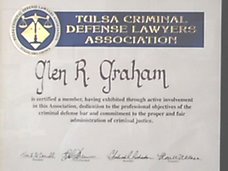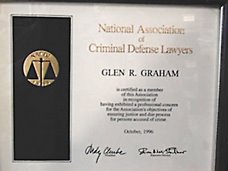Tulsa Criminal Defense Attorney, Director Best Lawyers of Oklahoma, Tulsa, Oklahoma
Phone: (918) 583-4621 or email glengraham@icu.net
Over the years, the court system in Tulsa County has evolved and adapted to changing times and circumstances. Historically, Oklahoma has had a high rate of incarceration. In 2006, Oklahoma lead the nation in the rate of incarceration for female offenders. In response to public and political pressure and budgetary issues, the Oklahoma court system has evolved and developed alternative sentencing procedures and alternative courts to handle alternatives to incarceration.
The costs of incarceration versus the costs of alternatives to incarceration are significant enough to cause people to consider alternatives to building expensive prisons. Some people began searching for alternatives to incarceration even though the prison industrial complex offers financial incentives for private prisons and financial incentives for certain depressed areas.
As technology continues to advance, other alternatives to incarceration have begun to appear and to be in use in some of the alternative court programs in Tulsa County. The DUI-Drug court routinely requires either a scram (which is worn like an ankle bracelet and continuously measures perspiration for alcohol) or a telephone sobrietor monitoring system (which is attached to the telephone and when the person breathes into the machine it sends a signal as to the results). Also, there is often a requirement that an inter-lock alcohol breath testing device be installed in any vehicle in which the participant may operate. A global position monitoring system (GPS) is also available in appropriate cases. The technological progress and advancements are continuing to provide a multitude of less expensive means of supervising people without expensive prison costs.
It is only a matter of time until someone develops mobile electronic drug testing devices. See research at http://www.criminology.fsu.edu/journal/ They could would work on the same or similar principles to the scram or telephone sobrietor and car interlock testing devices.
The Tulsa DUI court and the Tulsa Drug court, basically run along the same basic model. It is limited to felony offenses, and normally repeat offenders or offenders that may be looking at possible incarceration and the alternative court is an alternative to incarceration. It is a “treatment” approach whereby the offender if they qualify and if the prosecutor agrees, can obtain treatment under strict guidelines and close court supervision. It is a four or five stage process. Initially, the offender is required to attend 3-4 AA or NA meetings per week, random UA’s, a counseling session, and make one court appearance per week for review before the Judge. After several weeks the offender will progress to the next stage and so on. Upon completion of the program at the end of about 18 months, then the offender is placed on probation and will see a probation officer for a period of time. It is not unusual for an offender to relapse and to require inpatient treatment several times. The Drug court and DUI court is a treatment oriented program and relapse and treatment are typical. After about 18 months, if the offender is unable to complete the program, there may be a motion to terminate filed by the prosecutor seeking to incarcerate the offender for failing to comply. A hearing may be held where the court will take testimony and make a decision about whether to terminate, incarcerate, or pass sentencing one more time for the offender to complete the program. At some point, which is usually after about 18-36 months, the offender will run out of time to complete the program.
The Tulsa County mental health court for criminal offenses is a new program and one of the first in the nation and the funding is severely limited at this time, so that means there may be a limited number of openings and that some people may be turned down. There may be some people that are on the borderline or that are marginally qualified but they may be turned down because of a limited number of openings and severe funding limitations.
The Tulsa County mental health court for criminal offenses is for non-violent offenders who suffer from some kind of severe mental illness. It is modeled along the same lines as the drug-dui court. The offender must have a non-violent offense and a non-violent background to qualify. The District Attorney makes the initial determination if the offender will be considered acceptable for the “mental health court.” The offender will be subject to an initial mental health assessment by the court approved assessor. If the offender does not qualify, the court may reject the offender. If the offender qualifies, then the offender has a treatment provider and a counselor and is required to make regular court appearances.
The Tulsa Community Sentencing Court which is also called the Tulsa Accelerated Accountability Procedure Court (AAP) offers an alternative for non-violent offenders to expedite their case through the court system. The offender is typically a non-violent offender and the prosecutor will review the case to see if the offender qualifies for admission into the AAP court.
The offender will be required to complete a Level of Services Inventory (LSI) which is an assessment to determine what the needs of the offender are and what level of services may be required. If the offender qualifies in the moderate range which is a point system, then the offender may qualify to be approved for a community sentence. A community sentence is probation with a community sentencing officer as the probation officer. The community sentencing officer is supposed to help the offender find the services in the community and to supervise the offender. If the offender relapses or violates the community sentencing rules, the offender may be “sanctioned” by requiring treatment or about 10 days in jail. If the offender continues to violate the rules or has a serious rule violation such as a new offense, then the offender faces the possibility of the revocation of the probation and the possibility of being sentenced to prison. A community sentence is better than regular probation in that like it sounds is an alternative to prison and attempts to find services in the community to meet the needs of the offender instead of prison.
If the offender scores in the high point range on the Level of Service Inventory (LSI) then the offender may be placed on probation through the Department of Corrections but the offender will not be on a community sentence. The supervision by the Department of Corrections is more law enforcement oriented and less community sentencing oriented. Some would analogize it to being on probation with a law enforcement supervisor instead of a community sentencing –social-psychologist –type supervisor. A community sentence probation can be better for the offender and for society in the long run because of the attempts to achieve real change and the attempts to find help for the offender in the community. Unfortunately, for some reason, some offenders fail to take advantage of all of the services and all of the help that is offered by a community sentence. In theory, if the offender qualifies, some of the services may be subsidized and the offender would not have to pay for everything themselves (in theory).
By Glen R. Graham, Tulsa Criminal Defense Lawyer, my email glengraham@icu.net Web Page http://www.glenrgraham.com






4 comments:
Thanks for the comment at my blog about my post on dying clients. I'm too tired right now (working on a brief) to respond or read very well, but I'll check out your blog again.
I got a comment from a family member so I'm going to start considering who might stumble across it the next time I post!
dave tarrell
I completed the Tulsa County Drug Court Program and Thankfull that it was there. The problem with Oklahoma and drugs is that a Sex Offender will do less time and easier time than a drug addict. People who have a Drug problem most of the time can be helped with some treatment, however the DUI/ Drug court is tuff and unforgiven sometimes and they tend to give up on people and or people give up on themselves. Marijuana is illegal but you dont see people robbing stores on pot. The Only drugs that Oklahoma should be concerned about is Meth, Cocaine, and illegal prescription drugs and few other hard core drugs. Oklahoma should jump on the same train 13 other states have and decriminalize Marijuana and put a tax on it. Instead they fill the prisons with people for a little Pot when the bed space should be for violent criminals and sex offenders and criminals who pose a threat to the general public. That is my opinion on the subject. With that said Mr. Graham your are a great attorney and hope you help those who need it the most. thanks drug court graduate!
Mr. Graham has listed the forms for the application to Tulsa Drug court on his site at
http://www.glenrgraham.com/id63.html
He also lists the applications to Tulsa Mental Health Court and Tulsa DUI Court and Tulsa Veterans Court.
I entered TCDCP on March 13, 2006.
When I entered the Drug Court program I had spent almost 30 years of my life abusing drugs and alcohol. Because of my addiction and lifestyle in 1998 I was introduced to The GA Department of Corrections for women! In prison, the word “addiction” was never mentioned to me, much less treatment.
I left DOC custody in late 2001 and returned to my home state of Oklahoma. I continued to abuse alcohol and drugs...In fact I abused drugs and alcohol while I was in prison. Addiction is a progressive disease, and by 2004 my disease was progressing again into criminal behavior.
After multiple arrests in between 2004 and 2006 my behavior and lifestyle led me back to jail and I was pretty certain that I would spend the rest of my life in prison…however… on March 13 2006 I was accepted into a program called Drug Court…I didn’t know anything about Drug Court and I certainly had no idea how to stay clean and sober; and for about the first 6months I just went through the motions" but my attitude began to change as I gained insight and understanding of my addiction…Through the various groups and meetings that I was required to attend I learned to change my thinking. I worked on making changes in all areas of my life and gained an appreciation for being clean and sober.
The Drug Court Program gave me the tools I need to stay clean and sober, it also gave me resources and assistance in others areas of my life that I needed greatly. I was put into contact with a clothing store that donated clothing to me so I could dress appropriately for job interviews. I had help in building a professional resume, and someone even coached me as I practiced job interviewing skills!
I graduated from the Tulsa Drug Court Program on October 31, 2007.
Today, I have an amazing life that I would not trade for anything that I ever had while using. I will always be an addict and I strive to do something every day for my recovery.
I have been clean from all drugs, including alcohol for over 5 years. And during this time my life has greatly improved… I own a beautiful home. I am married to a wonderful man, and together we founded and operate a non-profit agency that offers a State Certified DUI School, as well as substance abuse/relapse prevention and anger management groups… 2-yrs ago I started an outreach program for the homeless in the Tulsa area; during the Winter months we provide over 500 sack lunches each month to those less fortunate.
In July of 2006 my mother passed away from a long illness; But I was clean and sober, I was able to be with my family during this painful and emotional time. Shortly after I graduated drug court I regained custody of my youngest daughter who still resides with us and now attends college in Tulsa. My oldest daughter and my 2 grandchildren live within 5 miles of us and we share a healthy relationship. I have a great relationship with my 80-yr old father-in-law, my two brothers and other members of my family that I had lost contact with while struggling with addiction.
And most recently I finished my training and received my credentials with the Oklahoma Department of Mental Health and Substance Abuse Services as a Recovery Support Specialist. Because of Drug Court I have many beautiful relationships and gifts in my life today, the biggest gift I have is freedom from active addiction.
Post a Comment